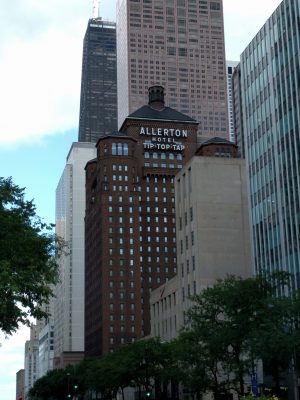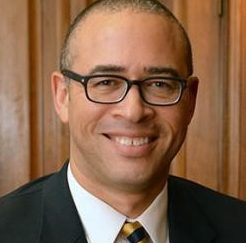CALL FOR PAPERS
2018 S-USIH CONFERENCE
CHICAGO

The Warwick-Allerton Hotel, circa 2017 (from the south along Michigan Ave).
The Society for U.S. Intellectual History invites proposals for its 2018 annual conference. This year’s event will be held November 8-11, 2018, at the Warwick-Allerton Hotel, a historic hotel on Chicago’s Magnificent Mile. The Warwick-Allerton is a short walk or cab ride away from Lake Michigan, the Loop, the Newberry Library, the Chicago Historical Museum, the Museum of Contemporary Art, Navy Pier, and hundreds of restaurants.
The 2018 theme is “Anti-Intellectual Sensibilities.” We interpret this broadly to include topics such as “alternative facts,” unreason, anti-elitism, ignorance, the distortions of ideology, thoughtlessness, post-truth phenomena, and anti-establishment movements. We expect to see proposals touching on science, culture, politics, race, gender, government, society, education—covering all time periods and various events in U.S. history. In addition, the year of 2018 presents opportunities to consider several specific and ongoing anniversaries: 10 years since the start of the Great Recession, 25 years since President Clinton took office, 50 years since Chicago ’68, 100 years since the Bolshevik Revolution, and 150 years since the impeachment of Andrew Johnson. Given our conference site, connections are also encouraged to Chicago history and major Midwestern figures and movements.

Jonathan Holloway
Our opening night keynote speaker is Jonathan Holloway, Provost at Northwestern University and historian with a distinguished research record on the social and intellectual aspects of post-Emancipation U.S. history. He is the author of Jim Crow Wisdom: Memory and Identity in Black America Since 1940 (North Carolina, 2013), the editor of Ralph Bunche’s A Brief and Tentative Analysis of Negro Leadership (NYU Press, 2005), and co-editor of Black Scholars on the Line: Race, Social Science, and American Thought in the 20th Century (Notre Dame Press, 2007). Holloway also authored an introduction for a new edition of W.E.B. Du Bois’s Souls of Black Folk (Yale Press, 2015). He is currently working on a new book, A History of Absence: Public Narratives, Race, and the Making of the Modern World.
There will be plenary panels and sessions, on Friday and Saturday, with presentations from Molly Worthen, Sophia Rosenfeld, Heather Cox Richardson, Leo Ribuffo, Rick Perlstein, Geraldo Cadava, and others. We are also pleased to announce that the African-American Intellectual History Society (AAIHS) will have a robust presence at the 2018 conference, sponsoring five panels.
The Conference Committee looks forward to your submissions on the timely, evergreen theme of “Anti-Intellectual Sensibilities.” Apart from that, we are glad—as always—to consider submissions that address any aspect, period, or problem from the history of American thought. Our annual meeting is meant to be a rich and diverse forum for those working in the realm of intellectual history. With that, we encourage scholars from across the disciplines, as well as scholars at all stages of career development, to propose topics, panels and papers.
We invite traditional panels (4-6 w/presenters, chair, commentator), roundtables (4-6 discussants and chair), and guided discussions (3-4 moderators, who lead breakout discussion groups). See below for more on each.
The deadline for submissions is May 1, 2018.
———————————————————————————————————————
Types of Submissions
The committee will consider the following types of submissions:
Traditional Panels: 4-6 people
A traditional panel will include a chairperson and either three or four presenters. The panel chairperson may also serve as a commentator, or the panel may include a separate commentator. Traditional Panel submissions must include the following materials: a title for the panel; a designated chair; names, email addresses, and institutional affiliations (if any) of all panel participants; a 300 word abstract for each paper; a separate 500 word abstract for the entire panel; a one-page CV for each participant.
Roundtables: 4-6 people
A roundtable will include four or five discussants. One of the discussants may serve as the roundtable chair/moderator, or the roundtable may include a separate chair/moderator. Roundtable submissions must include the following materials: a title for the roundtable; names, email addresses, and institutional affiliations (if any) of all roundtable participants; a 300 word description of each discussant’s expected contribution to or intervention in the discussion; a separate 500 word abstract for the entire roundtable; a one-page CV for each participant.
Guided Discussions: 3-4 People
Guided Discussion sessions ask the audience to consider four interrelated scholarly or pedagogical questions. Presenters each speak for 5-10 minutes, laying out one of the four questions. Audience members then split into four groups, each led by one of the presenters to discuss the question s/he asked. Presenters then report their table’s discussion to the room and a room-wide discussion is held. Guided Discussion submissions must include the following materials: a title for the session; names, email addresses, and institutional affiliations (if any) of all discussion leaders; a proposed discussion question and a 300 word abstract from each discussion leader; a 500 word abstract for the entire session; a one-page CV for each participant.
Submission Guidelines
- The committee is especially eager to ensure a diverse representation of scholars at the conference. We welcome submissions from graduate students, professional historians, academics working in adjacent fields, scholarly professionals working outside the academy, and independent scholars. We strongly encourage organizers to create panels reflecting the diversity of our field in terms of gender, ethnicity, sexual orientation, and/or institutional prestige of panelists.
- Individuals may appear on the program no more than twice. Those appearing twice must do so in two distinct capacities (paper presenter, panel commentator, roundtable discussant, etc). Participants may, for example, deliver a paper and be a panel commentator, but may not present two papers.
- Panels that require a projector or other audio-visual hookup must notify the committee at the time of submission.
- The committee will assume that submission to the conference is an indication that participants will be attending the entire conference. We will be unable to accommodate special scheduling requests.
- All persons appearing on the program will be required to register for the conference and to become members of S-USIH.
- Deadline for submissions is May 1, 2018. All submissions must be submitted via email as a single .docx or .pdf file.
- Submissions must be emailed to the following address: [email protected]
Panel / session organizers will be notified of the committee’s decision no later than June 15, 2018. Questions regarding the 2018 conference may be sent to the conference email address, linked above.
